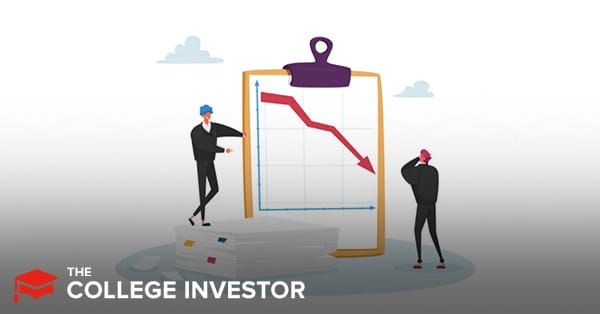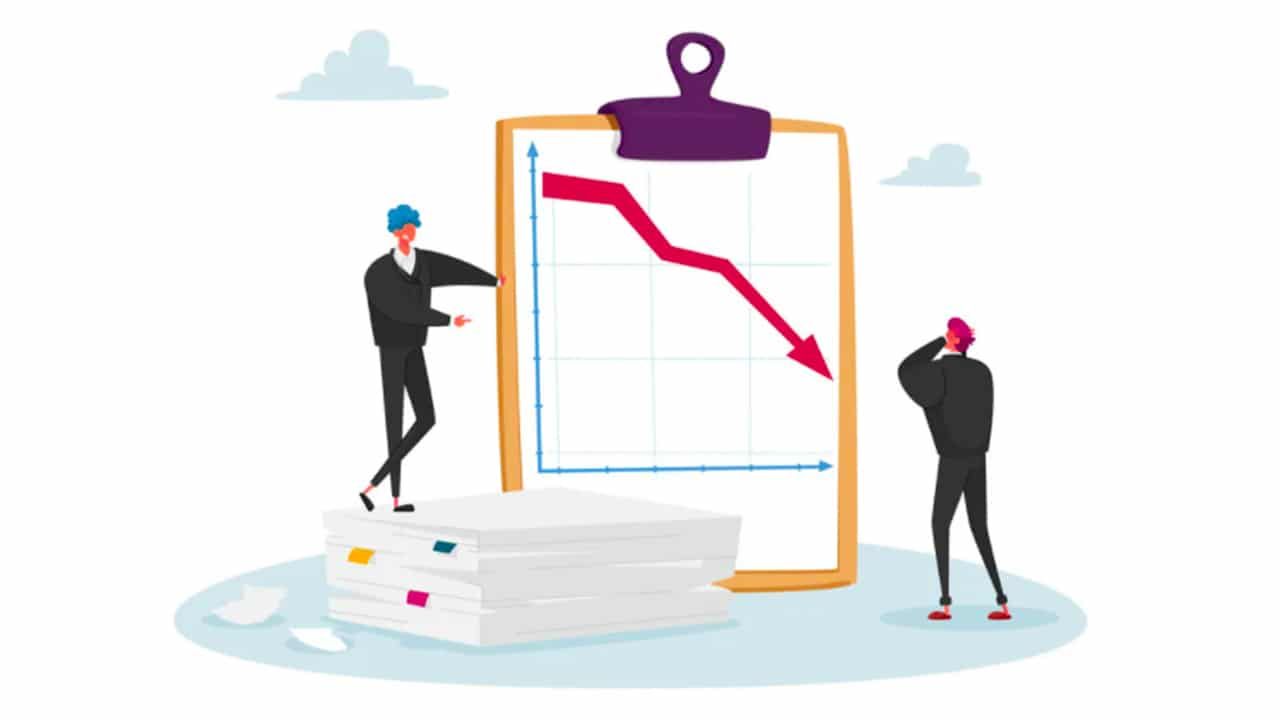
Planning for a stock market crash implies that you know a crash is coming.
However, none of us has a crystal ball. Trying to predict when a future stock market will happen can be a futile exercise.
But that doesn't mean you're out of options if you're wanting to put yourself in the best position to weather the next stock market storm whenever it occurs. One of the best ways to be successful over the long term is to simply have an understanding of your risks.
Let's explore what you can do to plan your portfolio for a stock market crash.
How To Know If A Stock Market Crash Is Coming
There isn't a surefire way to know that a market correction is coming. But investors may assume a pullback is in the cards based on their technical research.
If you want to know if the market or economy is getting into upside extremes, there are a few things to look out for. Below is a list of signs to keep an eye on.
P/E Ratios
P/E (price to earnings) valuations for the S&P 500 index historically ranges in the 15-16X area. But as of December 2021, the S&P 500 P/E ratio is much higher at nearly 21X.
By historical terms, that's certainly overvalued. However, the market has been overvalued for a long time. And if you had tried to build a "crash-proof" portfolio a year ago, you would have missed out on some of the best gains in history.
Economy
But if a country is struggling with rates of unemployment or wages have decreased, consumers will also decrease their spending. This will result in lower earnings for the companies that trade on the stock market.
Company earnings are one of the foundational factors that can affect a stock's share price. So lower earnings often eventually leads to lower prices. In this way, an economic recession can eventually cause the stock market to tumble as well.
Leading Economic Index (LEI)
The Conference Board Leading Economic Index (LEI) is a great way to monitor how the economy is doing. It includes 10 different components that are meant to identify peaks and troughs in the business cycle. The LEI can help investors predict how the economy will perform over the next few quarters.
FED Policy
Central banks around the world continue to manipulate modern markets. If the FED is pumping money into the market every month, as it is now, the market is likely to continue going up. However, if the FED is not adding money to the market and is also raising interest rates, it can be a drag on market performance (and the economy) and even induce a correction.
The Problems With Trying To Time The Market
If you believe a stock market crash is coming, you may be tempted to orient your portfolio from "risk-on" to "risk-off." That usually means reducing equity positions, raising cash, and probably increasing bond holdings. It could maybe even include adding gold.
The problem is that the stock market can look like it's about to crash for years before it actually does. So you’ve positioned your portfolio for a pullback, the market continues to rise instead. The end result is that you miss out on a lot of gains.
Worse, if you reorient your portfolio for a crash and decide to buy put options as a hedge for the crash that never comes, you may end up with negative return. For the average long-term investor, trying to time the market isn't a move we typically recommend.
How Plan Your Portfolio For A Stock Market Crash
So if market timing isn't the answer, how does one prepare their portfolio for a stock crash? Here are three steps that you can take to ensure that you're not caught flat-footed.
Check Your Asset Allocation
When most financial experts talk about asset allocation, they're referring to the ratio of stocks to bonds in your portfolio. The more that your portfolio is weighted towards stocks, the more aggressive it's considered to me; bond-heavy portfolios, meanwhile, are considered conservative.
When you first set up your portfolio on your own or with a robo-advisor, you may have selected a target asset allocation based on your risk tolerance. But your portfolio allocation can shift away from its target over time, usually due to your stock market investments outperforming your bond investments.
These shifts often go unnoticed when the market is making gains. But they can exacerbate your losses during market corrections. Let's say, for example, that you're target allocation is 70% stocks and 30% bonds. As a a general rule, your portfolio's troughs and peaks should be less pronounced than a portfolio that's composed of 95% stocks and 5% bonds.
However, let's say that over a period of several years your allocation has gradually moved off your target and is now 85% stocks and 15% bonds. In this case, your portfolio is likely to suffer a steeper decline during a stock market crash (although it should still be less precipitous than the investor who's portfolio has a 95/5 stocks-to-bonds ratio).
If you're worried that a stock market crash could be forthcoming, check to make sure that your asset allocation is still in line with your target. If it's not, you should take the steps to rebalance your portfolio. We explain how to do that here >>
Consider Your Investment Horizon
An "investment horizon" is the length of time that investments will be able to grow before an investor will need to sell them to access their cash value. Your investing horizon should play a major role in how you prepare your portfolio for a stock market crash.
If you're mostly investing for retirement, and you don't plan to retire for another 20 years, you should probably follow the "do nothing" strategy. Just keep investing and stay the course throughout the inevitable ups and downs that the stock market will experience before you'll need sell any of your securities.
On the other hand, if you're planning to retire in two years, a stock market crash could be devastating. There may simply not be enough time for the market to rebound before you'll need to start taking withdrawals.
Whether you think a stock market correction is coming or not, it's generally a good idea to gradually shift your asset allocation towards a more conservative mix as you near your withdrawal date. You can do this yourself or you could invest in a Target Date Fund which will do this for you automatically.
Don't Be Afraid To Seek Out Professional Help
If an impending stock market crash is keeping you up at night, sitting down with a financial planner could help you build a plan and gain peace of mind. Professional advisors should be monitoring the market for excesses and know when to make small to moderate reductions in equity holdings.
These reductions in equities won't be as extreme as you might see from a novice investor who's trying to time the market. Their only meant to lessen the impact of a potential market correction. If the market crashes, the investor’s portfolio will hopefully generate negative returns for a shorter period of time.
In many cases, an advisor may simply reassure you about your investment strategy and recommend no defensive actions. If they do make allocation recommendations, it will be the intention of still being able to take advantage of gains if the market continues higher.
You may also want to consider moving your investments over to a robo-advisor. Robo-advisors can help you build a custom portfolio that matches your risk tolerance and investment horizon and they'll automatically rebalance your asset allocation over time. Plus, they generally charge much lower management fees than human advisors. Check out our top robo-advisor picks.
Final Thoughts
There are many ways to monitor the economy and market for signs of a potential correction. Newsletters that consolidate market and economic data can be helpful. You can also do your own technical analysis using common indicators like P/E ratios.
Ultimately, optimizing your asset allocation is the best way to prepare your portfolio for a stock market crash. And, as mentioned above, working with a financial planner or robo-advisor can help you build a portfolio that has the right asset mix for your needs and goals.

Robert Farrington is America’s Millennial Money Expert® and America’s Student Loan Debt Expert™, and the founder of The College Investor, a personal finance site dedicated to helping millennials escape student loan debt to start investing and building wealth for the future. You can learn more about him on the About Page or on his personal site RobertFarrington.com.
He regularly writes about investing, student loan debt, and general personal finance topics geared toward anyone wanting to earn more, get out of debt, and start building wealth for the future.
He has been quoted in major publications, including the New York Times, Wall Street Journal, Washington Post, ABC, NBC, Today, and more. He is also a regular contributor to Forbes.
Editor: Clint Proctor
